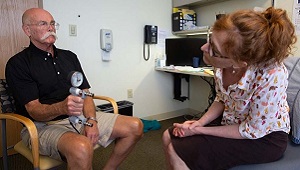7 ways to protect your brain — and your thinking power

Bicyclists aren’t the only ones trying to avoid head injuries and other causes of dementia. Here’s advice for you.
Want to maintain your thinking power over the long haul? Wearing a helmet can help prevent brain injuries that can lead to cognitive decline. But lack of exercise, poor diet, use of certain medications, and more can also put brain health at risk.
Dr. Eric B. Larson, senior investigator and former executive director of Kaiser Permanente Washington Health Research Institute is a leading expert on healthy aging. He offers these tips for protecting your brain. Together, these strategies may even help you sidestep dementia as you age — or at least postpone its onset.
1. Get regular exercise.
Exercising, even just walking, reduces the risk of developing dementia. Several studies, including from Kaiser Permanente Washington Health Research Institute, show that exercising for at least 15 minutes at least 3 times a week lowers the risk of developing dementia by 30% to 40%.
Find an activity you enjoy such as hiking, bicycling, swimming, aerobics or water aerobics, weight training, or stretching.
2. Control your risk for heart problems.
Cardiovascular conditions — including high blood pressure, high cholesterol, diabetes, and abnormal heart rhythm — can raise your risk for dementias like Alzheimer’s disease. So do what you can to reduce your risk by eating a healthy diet, not smoking, and getting regular physical activity.
3. Manage your blood sugar levels.
Research has long shown that high blood sugar due to diabetes can raise your risk for many health problems, including Alzheimer’s disease and other dementias. But in 2013, a research team from KPWHRI and the University of Washington discovered that high blood sugar raises your risk for these conditions — even without diabetes. That’s one more reason to avoid food and drinks high in sugar, such as sweetened sodas.
4. Reduce or stop using certain medications.
Stay informed about prescription and over-the-counter drugs you are taking, especially long-term, for chronic conditions. Avoid dangerous drug interactions and being overmedicated, which can lead to memory problems and dementia.
Some medications are especially risky for brain health. Studies by Dr. Larson and others show that anticholinergics are linked to a higher risk of developing dementia. Anticholinergics include some medications to control depression, bladder activity, allergies, and sleep problems. A common anticholinergic found in over-the-counter medicines is diphenhydramine, also known as Benadryl.
If you are taking an anticholinergic, read our FAQs and discuss other treatments with your doctor.
5. Protect against hearing loss and social isolation.
Hearing impairment adds to dementia risk but can be treated. To reduce hearing loss, no matter what your age, avoid excessive noise. If you think you have impairment, get your hearing checked and don’t be too proud to use a hearing aid. Being able to hear prevents social isolation and loneliness, which also increase the risk of cognitive impairment.
6. Limit stress and get the sleep you need.
When we’re under stress, we make a hormone called cortisol, which has a stronger effect on older brains. This challenges an older person’s ability to recover from emotional upset. Knowing this, it’s best for older people to take change slowly and learn ways to cope with anxiety or tension.
Alcohol is not recommended to help you relax because long-term overuse clearly leads to cognitive impairment. Drink moderately (1 drink a day for women, 2 for men), if at all.
Rest is important for managing stress. Research shows that inadequate sleep is linked to slower thinking and more risk for dementia. Individual needs vary greatly — but most guidelines recommend getting 7 to 9 hours of sleep a night. Frequent trouble sleeping does not mean you need to take sleeping pills for insomnia. Such drugs can actually worsen cognitive problems. Instead, try these ways to sleep better.
7. Avoid all types of head injury.
Whether you are a competitive athlete, play sports for fun, or exercise for health, taking care to avoid head injuries should be part of your routine. Evidence shows that a concussion may harm your brain — both immediately and long-term. In fact, head injuries suffered in youth have been linked to increased risk for dementia, including Alzheimer’s disease, in old age.
To protect your head from bumps and bruises, wear a strong helmet when biking, skiing, skating, or participating in other sports. Drive safely to prevent traffic accidents. And avert falls:
- Wear glasses or contact lens if you need them.
- Wear lace-up or Velcro shoes with solid heel support.
- Wear shoes indoors rather than walking barefoot or in your stocking feet.
- Avoid medications or alcoholic beverages that make you unsteady or dizzy.
- Use a cane or walker if you need it.
- Clear your home of trip hazards like electrical cords, loose rugs, slippery bathing surfaces, and poorly lit walkways.
Find out how scientists in the joint KPWHRI-University of Washington ACT study keep learning about the brain and aging.
aging and geriatrics

The ACT Study: Looking toward the future
At 25 years, the Adult Changes in Thought Study is committed to science, collaboration, and jokes, writes Erin Bowles



